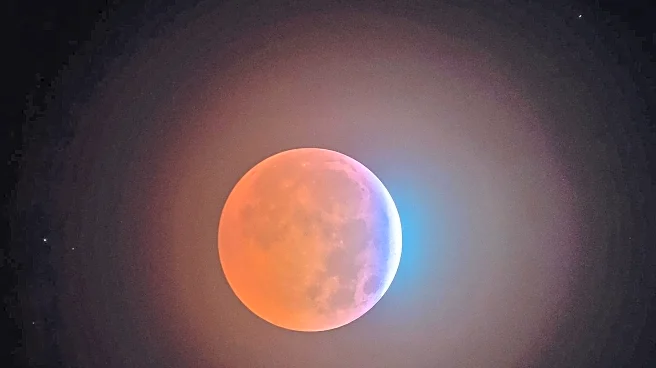What's Happening?
A total lunar eclipse, commonly referred to as a 'Blood Moon' due to its reddish hue, is set to occur on the night of September 7 and 8, 2025. This event marks the second and final total lunar eclipse of the year, lasting over five hours with 82 minutes of full totality. The eclipse will be visible in regions including India, China, Russia, western Australia, eastern Africa, and much of central Asia. The western Pacific, Indian Ocean, Antarctica, and parts of eastern Africa are also prime viewing locations. Unfortunately, North America will miss the full spectacle as the moon will have already set, though the western tip of Alaska might catch a partial phase. In the UK and western Europe, observers may see part of the totality as the moon rises.
Why It's Important?
The 'Blood Moon' phenomenon is significant for astronomers and sky enthusiasts worldwide, offering a rare opportunity to observe the moon's transformation without the need for special equipment. This event highlights the intricate dance between celestial bodies and provides a unique chance for educational outreach and public engagement in astronomy. The eclipse's visibility across diverse geographic regions underscores the global nature of astronomical events, fostering a sense of shared experience and wonder. Additionally, the event may boost interest in astro-tourism, encouraging travel to optimal viewing locations and supporting local economies.
What's Next?
For those unable to view the eclipse directly, online platforms such as the Virtual Telescope Project in Italy will stream the event live, starting just after 5:45 pm UTC as the moon rises in Europe. This accessibility ensures that enthusiasts worldwide can participate in the experience, regardless of geographic limitations. As the eclipse approaches, local observatories and astronomy clubs may organize viewing events and educational sessions to enhance public understanding of lunar eclipses and their significance.
Beyond the Headlines
The 'Blood Moon' serves as a reminder of the interconnectedness of global communities through shared natural phenomena. It also highlights the importance of preserving dark skies and reducing light pollution to ensure future generations can enjoy such celestial events. The eclipse may inspire discussions on the cultural and historical significance of lunar events, as well as their impact on scientific research and technological advancements in astronomy.











